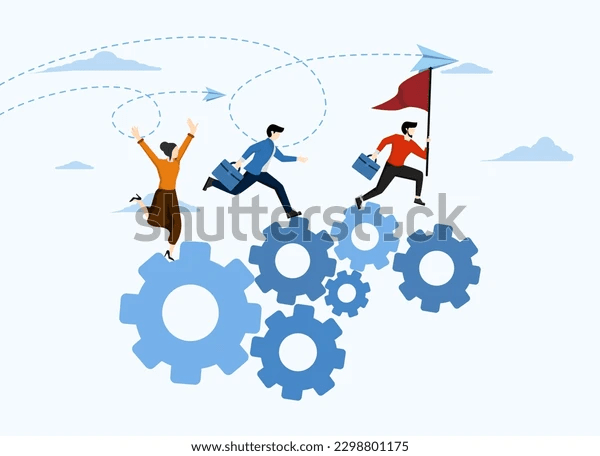Introduction
In today’s fast-paced and competitive business landscape, organizational efficiency is paramount to success. Influential leaders are pivotal in setting the tone and creating an environment that fosters organizational productivity and efficiency. This blog explores the importance of Leadership in driving efficiency and how implementing Objectives and Key Results (OKRs) can further enhance organizational performance.
Before we go any further, productivity and efficiency are two essential concepts in organizational management, aiming to achieve better performance and maximize results. While they share some similarities, they also have distinct characteristics that set them apart.
Productivity measures the organization’s output from time, labor, and materials. It aims to gauge how effectively these resources are utilized to produce goods or services. Efficiency is concerned with achieving desired results with the least amount of resources expended. It’s about streamlining processes and workflows to ensure tasks are completed most effectively and on time.
While productivity emphasizes output and resource utilization, efficiency minimizes waste, improves processes, and complements each other to achieve organizational success.
The Impact of Influential Leadership
Influential leaders serve as guiding beacons, providing a clear vision and direction for the organization. Communicating this vision ensures that every team member understands and aligns with the organization’s goals. Bill Gates wisely said, ‘Leadership is not about being the best. It is about making everyone else better.’ When employees feel connected to a common purpose, they are more motivated, focused, and driven to achieve excellence.”
Transparent Communication
Effective leaders establish open and transparent communication channels, breaking down silos and promoting collaboration. Transparent communication fosters understanding among team members and cultivates a culture of engagement. Employees feel empowered to share ideas and perspectives, leading to innovative solutions and improved decision-making processes.
Recognize capabilities
Great leaders recognize the unique strengths and talents of their team members. Leaders encourage teams to take ownership of their goals—employees who feel a sense of ownership become more proactive and accountable for their contributions.
Growth and Development
Leadership also plays a crucial role in nurturing employee growth and development. Forward-thinking leaders invest in training programs, mentorship opportunities, and skill-building initiatives. By keeping their employees updated with industry trends and helping them acquire new skills, leaders ensure that their workforce remains adaptable, and future-ready and contributes to organizational efficiency.
Some real-life examples where influential leadership has improved organizational productivity and efficiency
- Steve Jobs, the co-founder of Apple, was known for his visionary leadership and ability to inspire his team. Under his guidance, Apple developed revolutionary products like the iPhone and iPad, transforming the technology industry and boosting productivity and efficiency.
- Jack Welch, the former CEO of General Electric, is often credited with turning the company into a highly productive and efficient organization. He implemented a performance-driven culture, where employees were encouraged to take ownership of their goals and performance.
- Satya Nadella, the CEO of Microsoft, has been praised for his transformational leadership style. He encouraged a growth mindset among employees and focused on collaboration and innovation.
- Indra Nooyi, the former CEO of PepsiCo, was known for her strong leadership and commitment to sustainability. She implemented strategies to improve efficiency in the supply chain and introduced healthier product options to meet changing consumer demands.
These examples demonstrate how influential leaders can impact the future of an organization.
How do OKRs and Leadership jointly contribute to organizational efficiency?
When it comes to enhancing organizational efficiency and productivity, the synergy between OKRs and Leadership is a game-changer. OKRs provide a robust framework for setting clear and aligned goals across the organization, while influential leaders play a vital role in guiding teams toward achieving those objectives. They create a powerful force that drives success and elevates the organization’s performance through
Focus
With OKRs in place, teams gain a focused direction and a sense of purpose. They can prioritize task based on strategic importance, eliminating distractions and ensuring efforts are concentrated on high-impact activities. Influential Leadership enhances the efficiency as teams work cohesively towards common objectives.
Accountability
Leadership’s role in promoting accountability is another critical aspect of the synergy. By setting measurable OKRs, leaders empower individuals and teams to take ownership of their goals.
Collaboration
The collaborative efforts of Leadership and OKRs promote a culture of continuous improvement. Regular reviews and adaptability to changing circumstances ensure the organization stays agile and efficient, continuously refining strategies and optimizing performance.
The powerful synergy between OKRs and Leadership catalyzes organizational efficiency and productivity.
Conclusion
Influential leaders set the tone, establish open communication channels, empower their teams, and invest in growth, creating a high-performing workforce. When combined with the power of OKRs, these leadership principles amplify organizational efficiency by aligning goals, driving focus, encouraging accountability, and promoting continuous improvement.
By embracing effective Leadership and harnessing the potential of OKRs, organizations can unlock their true potential and achieve unprecedented success in today’s dynamic business landscape. The journey toward organizational efficiency starts with strong Leadership and the strategic implementation of OKRs.


